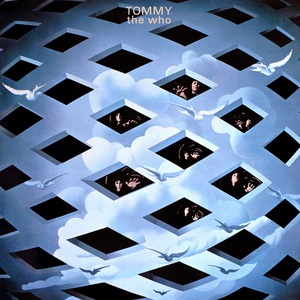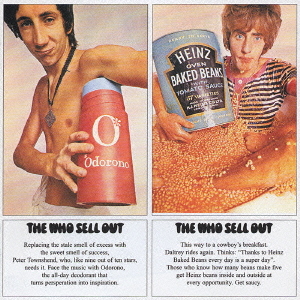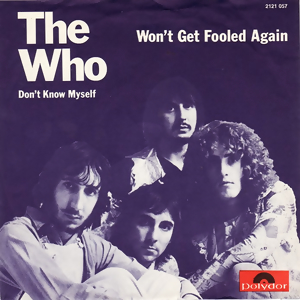
Keith John Moon was an English musician who was the drummer for the rock band the Who. Regarded as one of the greatest drummers in the history of rock music, he was noted for his unique style of playing and his eccentric, often self-destructive behaviour.

The Who are an English rock band formed in London in 1964. Their classic lineup (1964–1978) consisted of lead vocalist Roger Daltrey, guitarist Pete Townshend, bassist John Entwistle and drummer Keith Moon. They are considered one of the most influential rock bands of the 20th century. Their contributions to rock music include the development of the Marshall stack, large public address systems, the use of synthesizers, Entwistle's and Moon's influential playing styles, Townshend's feedback and power chord guitar technique, and the development of the rock opera. They are cited as an influence by many hard rock, punk, power pop and mod bands. The Who were inducted into the Rock and Roll Hall of Fame in 1990.

Peter Dennis Blandford Townshend is an English musician. He is the co-founder, guitarist, second lead vocalist and principal songwriter of the Who, one of the most influential rock bands of the 1960s and 1970s. His aggressive playing style and poetic songwriting techniques, with the Who and in other projects, have earned him critical acclaim.

Tommy is the fourth studio album by the English rock band the Who, released on 19 May 1969. Written primarily by guitarist Pete Townshend, Tommy is a double album and an early rock opera that tells the story of the fictional Tommy Walker and his path to becoming a spiritual leader and messianic figure.

Quadrophenia is the sixth studio album by the English rock band the Who, released as a double album on 26 October 1973 by Track Records. It is the group's third rock opera, the previous two being the "mini-opera" song "A Quick One, While He's Away" (1966) and the album Tommy (1969). Set in London and Brighton in 1965, the story follows a young mod named Jimmy and his search for self-worth and importance. Quadrophenia is the only Who album entirely written & composed by Pete Townshend.

Who's Next is the fifth studio album by the English rock band the Who, released on 14 August 1971, by Track Records in the United Kingdom and Decca Records in the United States. It developed from the aborted Lifehouse project, a multi-media rock opera conceived by the group's guitarist Pete Townshend as a follow-up to the band's 1969 album Tommy. The project was cancelled owing to its complexity and to conflicts with Kit Lambert, the band's manager, but the group salvaged some of the songs, without the connecting story elements, to release as their next album. Eight of the nine songs on Who's Next were from Lifehouse, with the lone exception being the John Entwistle-penned "My Wife". Ultimately, the remaining Lifehouse tracks would all be released on other albums throughout the next decade.

The Who Sell Out is the third studio album by the English rock band the Who. It was released on 15 December 1967 by Track Records in the UK and Decca Records in the US. A concept album, The Who Sell Out is structured as a collection of unrelated songs interspersed with fake commercials and public service announcements, including the second track "Heinz Baked Beans". The album purports to be a broadcast by pirate radio station Radio London. The reference to "selling out" was an intended irony, as the Who had been making real commercials during that period of their career, some of which are included as bonus tracks on the remastered CD.

Live at Leeds is the first live album by English rock band the Who, recorded at the University of Leeds Refectory on 14 February 1970 and released on 11 May 1970, by Decca and MCA in the United States and by Track and Polydor in the United Kingdom. It is the band's only live album that was recorded with the classic line-up of lead vocalist Roger Daltrey, guitarist Pete Townshend, bassist John Entwistle and drummer Keith Moon.

Quadrophenia is a 1979 British drama film, based on The Who's 1973 rock opera of the same name. It was directed by Franc Roddam in his feature directing debut. Unlike the adaptation of Tommy, Quadrophenia is not a musical film, and the band does not appear live in the film.

"Won't Get Fooled Again" is a song by the English rock band the Who, written by guitarist and primary songwriter Pete Townshend. It was released as a single in June 1971, reaching the top 10 in the UK, while the full eight-and-a-half-minute version appears as the final track on the band's 1971 album Who's Next, released that August. In the US, the single entered Billboard on 17 July, reaching No. 15.

"5:15" is a song written by Pete Townshend of British rock band The Who. Part of the band's second rock opera, Quadrophenia (1973), the song was also released as a single and reached No. 20 on the UK Singles Chart, while the 1979 re-release reached No. 45 on the Billboard Hot 100.
"Sea and Sand" is a song by The Who. It was released on the group's 1973 rock opera album Quadrophenia, where it is the second track of the third side of the record.
"I'm One" is a song by The Who. It was released on the group's 1973 rock opera album Quadrophenia. Written and sung by Pete Townshend, the song has since become a fan favorite.

"Zoot Suit" b/w "I'm the Face" was the first single of the British rock band the Who, who recorded it under the name the High Numbers in an attempt to appeal to a mod audience. "Zoot Suit" was written by Peter Meaden, the band's first manager. The song is a direct copy of "Misery" by the American R&B group the Dynamics, while the B-side, "I'm the Face", is a copy of Slim Harpo's "I Got Love If You Want It." The single was meant for a mod audience, but failed to chart. The band changed their name back to The Who, found new management, and released their own composition "I Can't Explain", which became a top ten hit in the United Kingdom.
"Drowned" is a song written by Pete Townshend, the guitarist for the Who, for their sixth album, Quadrophenia.

Amazing Journey: The Story of The Who is a 2007 documentary film by Murray Lerner and Paul Crowder about English rock and roll band The Who. The film features new interviews with band members Roger Daltrey, John Entwistle, Kenney Jones, and Pete Townshend, as well as Sting, The Edge, Noel Gallagher, Eddie Vedder, Steve Jones and others, as well as rare photos of the four members of the band, and archival live footage of performances dating back to 1964. A soundtrack accompanying the film also serves as a greatest-hits compilation for the band.
"Bell Boy" is a song recorded by the Who for the 1973 album Quadrophenia and 1979 movie of the same name. It was never released as a single.

The Tommy Tour was a concert tour by the English rock band the Who. It was in support of their fourth album, the rock opera Tommy (1969), and consisted of concerts split between North America and Europe. Following a press reception gig, the tour officially began on 9 May 1969 and ended on 20 December 1970. The set list featured the majority of the songs from Tommy, as well as originals and covers.












